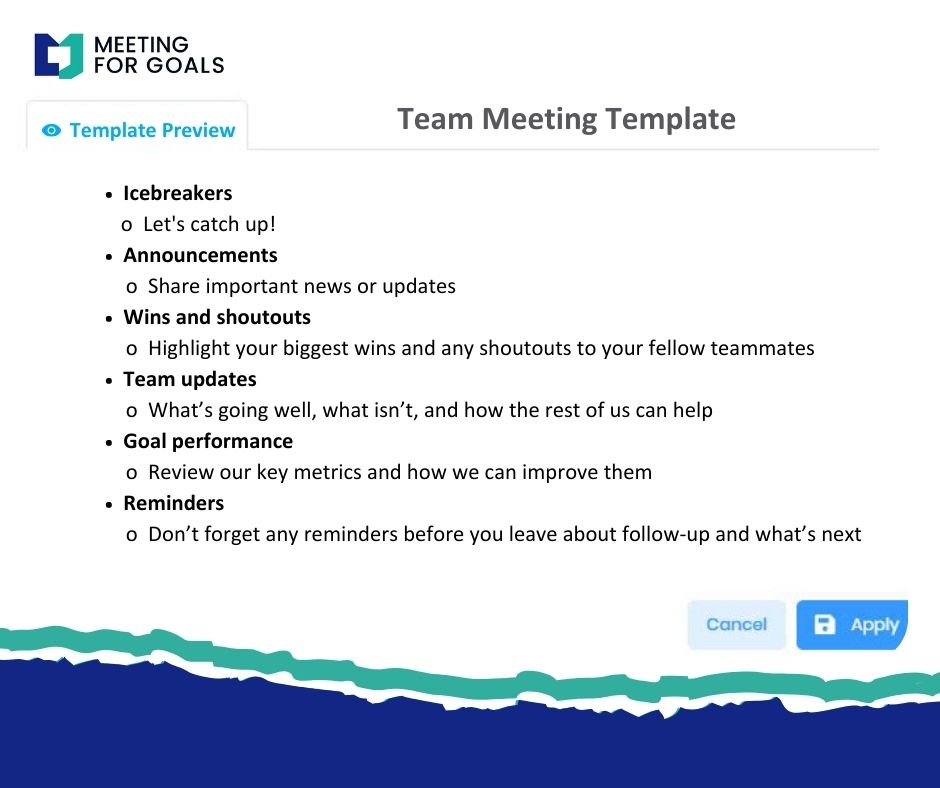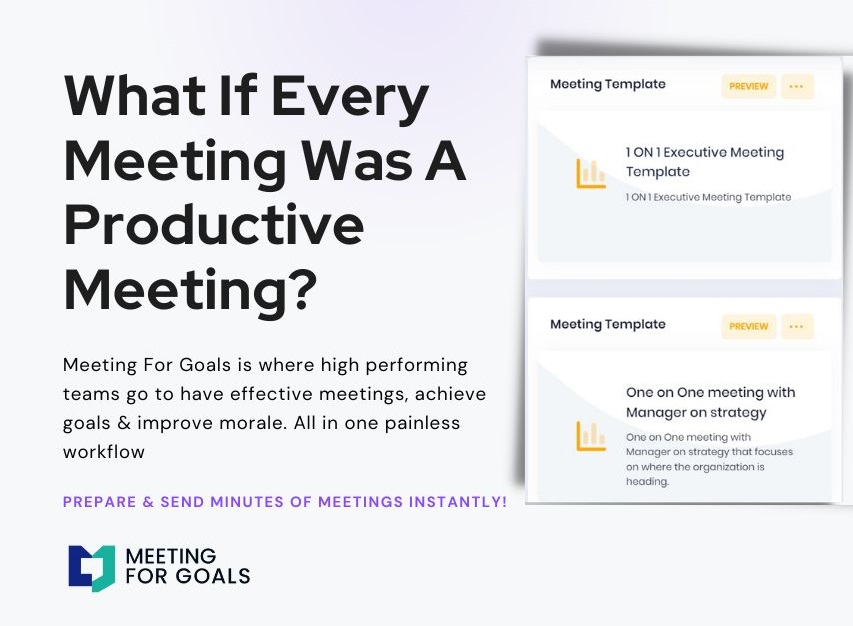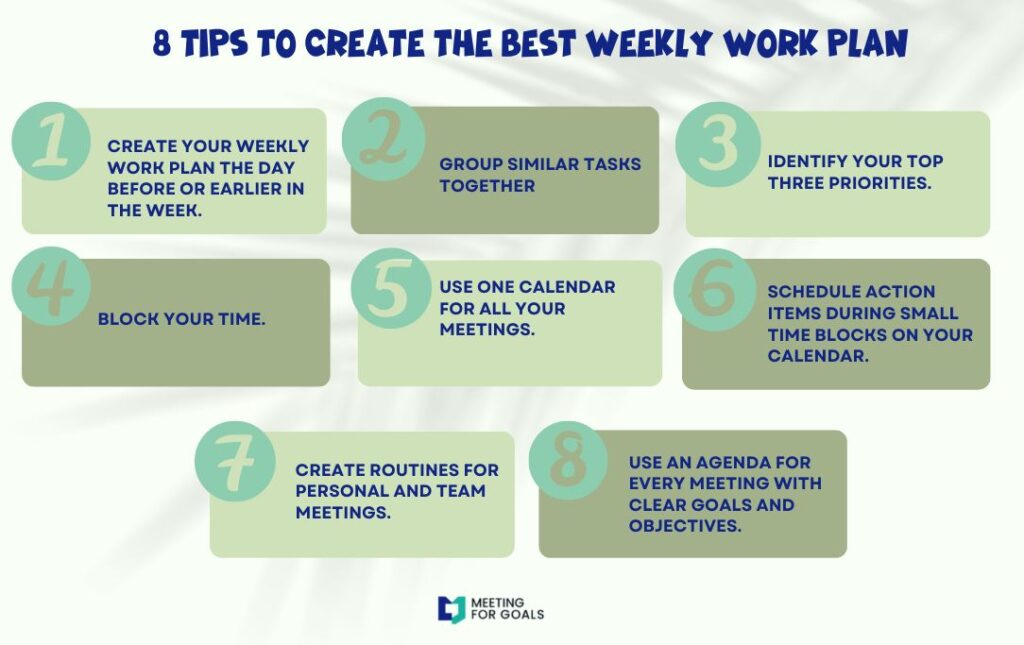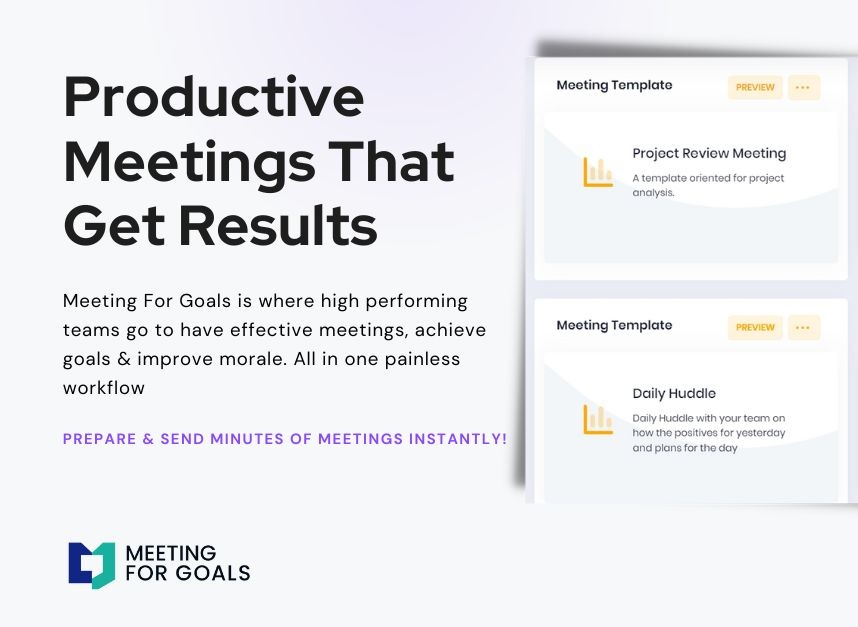Keyword Manager Meeting Topics: A Structured Approach Using Meeting For Goals
In today’s fast-paced digital environment, **keyword strategy** is the backbone of any successful online marketing campaign. However, many teams still struggle to stay aligned. The culprit? **Poorly managed meetings** and a lack of accountability.
That’s where **Meeting For Goals** comes in. It’s a powerful meeting management software that helps high-performing teams align every meeting with business objectives. It improves follow-through and saves time. Whether you’re a **VP of Marketing** or a **Director of SEO**, this guide will help you run keyword manager meetings that actually move the needle.
Want to skip ahead and start optimizing your meetings? Sign up for free at https://app.meetingforgoals.com/TenantRegistration/Register or check out our free meeting templates at https://meetingforgoals.com/meeting_templates.
Let’s dive in.
**Keywords** aren’t just search terms—they’re **strategic assets**. They drive visibility, attract traffic, and create opportunities for revenue. But as search engine algorithms evolve and user behavior shifts, managing keywords becomes more complex.
For companies with 40 to 70 employees, particularly those led by high-level executives, the challenge isn’t just choosing the right keywords. It’s about making sure the entire team stays aligned and accountable.
That’s where **keyword manager meetings** come in. When done right, these meetings can transform fragmented SEO efforts into a unified, **data-driven strategy**. But when done wrong, they waste time and lead to missed opportunities.
Meeting For Goals is built to solve that problem. It’s a meeting management platform that helps teams run shorter, more focused meetings that align with company goals. With features for agendas, task tracking, and performance monitoring, it’s your secret weapon for productive keyword strategy sessions.
In this guide, we’ll walk you through a **six-step process** to run effective keyword manager meetings using Meeting For Goals. You’ll learn how to:
- Set a **results-oriented agenda**
- Analyze **keyword performance** with clarity
- Brainstorm new **opportunities**
- Assign clear **responsibilities**
- Build **accountability** across the team
Let’s get started.
2 Minute Video
Watch a 2-minute demo of our meeting management software in action.
Setting the Agenda for Keyword Manager Meetings
The first step to a productive meeting is having a **clear agenda**.
Without it, conversations drift, time is wasted, and decisions don’t get made. For keyword manager meetings, where strategy and execution must go hand-in-hand, this structure is critical.
Start by asking: **What’s the purpose of this meeting?**
- Are you reviewing performance?
- Exploring new keyword opportunities?
- Assigning new tasks?
Define your goals upfront. Then create an agenda that includes:
- Review of action items from the last meeting
- Performance metrics and analysis
- Brainstorming new keyword opportunities
- Task assignment and accountability
Using Meeting For Goals, you can build and share this agenda in advance. Each item can be time-blocked to keep the meeting on track. For example:
- 10 minutes: Review previous tasks
- 15 minutes: Discuss performance
- 20 minutes: Brainstorm new keywords
- 15 minutes: Assign responsibilities
Timeboxing your discussions keeps things focused. Participants know they have a limited window, so they’re more likely to come prepared and stay engaged.
Meeting For Goals also includes built-in timers and agenda tracking. You can monitor how long each segment takes and adjust future meetings for better efficiency.
A well-crafted agenda is your roadmap. It ensures that every minute of your meeting is spent moving toward your goals—and that no important topic gets overlooked.
Adding an Agenda
How to add an agenda instantly on Meeting For Goals.
Review and Analysis of Current Keyword Performance
Once your agenda is set, it’s time to dive into the data.
This part of the meeting is all about understanding what’s working—and what’s not. For executives and team leads, it’s also where **ROI** becomes visible.
Start by reviewing **key performance indicators (KPIs)** like:
- Keyword rankings (Google, Bing, etc.)
- Organic traffic by keyword
- Conversion rates
- Bounce rates and engagement metrics
Don’t just look at the numbers—interpret them. Are certain keywords dropping in rank? Are others driving conversions unexpectedly? Is seasonality at play?
Encourage your team to share insights. Your SEO specialist might notice a drop due to a **Google algorithm update**. Your content manager might identify underperforming blog posts. This collaborative approach leads to richer analysis.
Meeting For Goals makes it easy to bring data into your discussions. You can upload reports, embed dashboards, or share screens—all within the platform. Better yet, you can document takeaways and next steps in real-time.
You can also link keyword performance directly to broader company goals. For example, if your quarterly objective is to grow **organic traffic** by 20%, you can track which keywords are helping—or hurting—that goal.
This kind of alignment is what separates tactical teams from strategic ones. It helps leadership understand how keyword strategy impacts the business as a whole.
Want to dive deeper into keyword performance metrics? This guide from **Moz** offers a great overview: https://moz.com/learn/seo/keyword-research.
By the end of this section, your team should have a clear picture of current performance—and be ready to explore what’s next.
Brainstorming New Keyword Opportunities
Now that you know what’s working, it’s time to identify new opportunities.
**Keyword brainstorming** doesn’t have to be chaotic. With the right structure, it can be one of the most creative—and productive—parts of your meeting.
Start by choosing a **brainstorming method**. Here are a few effective options:
- **Mind Mapping**: Visualize related keyword clusters.
- **SWOT Analysis**: Evaluate your strengths, weaknesses, opportunities, and threats.
- **Competitor Gap Analysis**: Use tools like **Ahrefs** or **SEMrush** to find keywords your competitors rank for—but you don’t.
Encourage everyone to contribute. Even non-SEO team members can offer valuable insights based on customer feedback, sales conversations, or content ideas.
Once you’ve gathered ideas, evaluate them using criteria like:
- Search volume
- Competition level
- Relevance to business goals
- Support for upcoming campaigns
Meeting For Goals helps you capture and organize ideas on the fly. You can categorize keywords by priority, assign follow-up tasks, and even link them to specific marketing goals.
This is especially useful for hybrid or remote teams. Everyone can collaborate in real time, no matter where they are.
You can also set up recurring brainstorming sessions and track the evolution of your keyword strategy over time.
For more ideas on **keyword research techniques**, check out this in-depth guide from **Backlinko**: https://backlinko.com/keyword-research.
A structured brainstorming process ensures that your team isn’t just tossing around ideas—but actually developing a **keyword roadmap** that supports your business strategy.
Assigning Responsibilities and Setting Accountability
Ideas are important—but execution is everything.
Once you’ve identified new keywords and strategies, it’s time to assign tasks and make sure they get done.
Start by clarifying roles. Who’s responsible for:
- Keyword research?
- Updating website content?
- Monitoring rankings?
- Reporting on performance?
Don’t leave anything vague. Use **SMART criteria** to define each task. For example:
- “Update meta descriptions on top 10 landing pages by Friday”
- “Research long-tail keywords for Q3 campaign by next Tuesday”
Meeting For Goals makes delegation easy. You can assign tasks directly during the meeting, set deadlines, and connect each task to a larger goal.
Each team member gets notified, and the platform tracks progress automatically. No more chasing down updates or sending endless follow-up emails.
You also get visibility into **task completion rates**. Managers can see what’s on track—and what’s falling behind. This transparency builds a culture of accountability.
Before your next meeting, Meeting For Goals can generate automated summaries of:
- Completed tasks
- Pending items
- Performance updates
This creates a continuous loop of action, review, and improvement.
For executives, this accountability framework is a **game-changer**. It ensures that strategic decisions made during meetings are actually implemented—and that your keyword strategy continues to evolve.
Looking for more ways to structure your keyword planning meetings? Explore our free meeting templates at https://meetingforgoals.com/meeting_templates.
Conclusion
**Keyword management** isn’t just a technical task—it’s a strategic priority.
To stay competitive, your team needs to continuously analyze, refine, and align your keyword strategy with broader business goals. And that starts with better meetings.
By following the **six-step process** in this guide, you can turn your keyword manager meetings into a powerful engine for growth:
- Set a focused agenda
- Analyze performance with clarity
- Brainstorm new opportunities strategically
- Assign tasks with clear ownership
- Build accountability into every step
Meeting For Goals is the ideal tool to help you do all of this—and more. It streamlines your meeting process, improves team alignment, and ensures that every discussion leads to action.
Ready to take your keyword strategy to the next level?
Sign up today at https://app.meetingforgoals.com/TenantRegistration/Register and experience the difference a structured, goal-driven meeting can make.
Or visit https://meetingforgoals.com to learn more about how we help high-performing teams stay focused, accountable, and aligned.
Your keywords deserve better meetings. Let’s make it happen.




